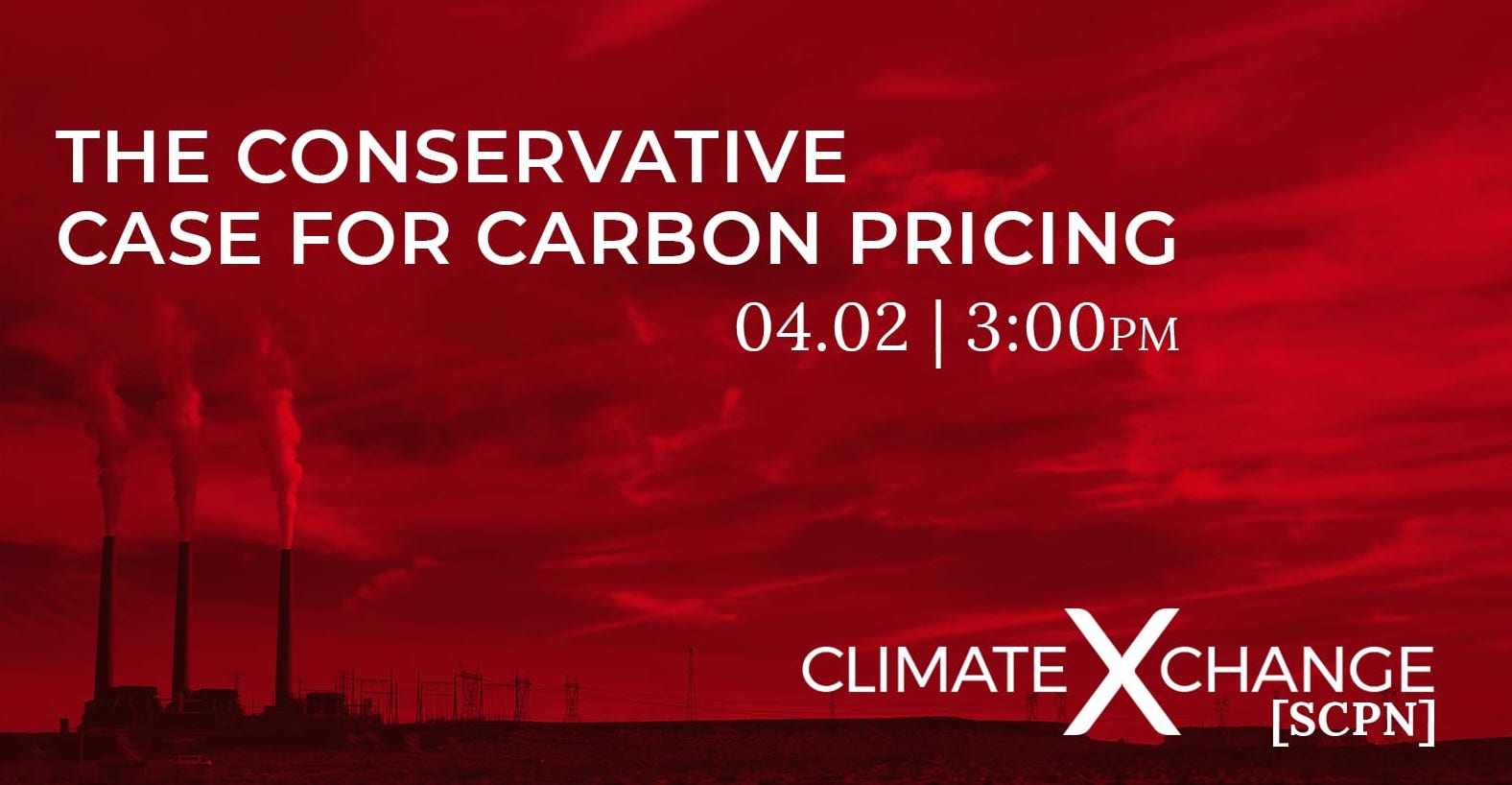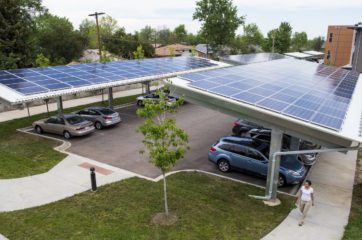In an era of extreme partisan gridlock, it has been difficult to gain bipartisan support for climate policy. Climate action is, in many ways, now perceived as a liberal issue, with Democrats introducing ambitious policy like the Green New Deal, and Republicans often fervently opposing it.
However, some conservatives have prioritized climate and environmental policy, pursuing market-based mechanisms as the optimal way to reduce emissions. Earlier this week, three experts — Alex Bozmoski (RepublicEn), Nader Sobhani (Niskanen Center), and Josiah Neeley (R-Street Institute) — sat down with the State Carbon Pricing Network to make a strong conservative case for carbon pricing.
Elevating Conservative Voices in the Climate Movement
Alex Bozmoski is the co-founder and Managing Editor of RepublicEn, an organization that works to amplify the voices of 7,600 conservatives and libertarians that support climate action, but have largely felt excluded from the conversation.
“The ideas on the table are often anathema to their worldview,” Bozmoski said. “They are alienated by an environmental movement that has been pushing them out, slowly but surely, for several generations.”
RepublicEn primarily works in conservative districts, rather than on Capitol Hill, to educate and elevate constituent voices. Why? Bozmoski said that even when conservative members of Congress do support climate action, and have promising ideas on how to legislate it, they are politically disincentivized to do so.
“The downside [of supporting carbon pricing] is really apparent — it’s risking a primary, it’s alienating you voter base, it’s getting folks to organize against you and make a lot of trouble,” he continued. “But the upside is pretty invisible. A lot of folks that say they’re climate activists are never going to be with you. And the conservatives that care deeply about this issue are not as vocal, because they don’t have a home from which to be vocal, a tribe to belong to.”
Bozmoski believes that if conservative constituents began prioritizing climate action, legislators would as well.
“We like to ask lawmakers, ‘How many of your right-leaning constituents giving you a call and saying ‘please lead on climate change’ would it take to make this a top priority issues?’” Bozmoski said. “These districts have 750,000 people in them, but the most common answer is about a hundred. So, it just doesn’t take many full citizens — people rising up to their duty of full citizenship — to really attract the attention of lawmakers to change the perception of risk and benefit on this issue.”
Overcoming Climate Denialism
Climate denialism, the belief or theory that climate changed by human activity is not occurring, has long been a political obstacle in the fight for climate action. According to a 2018 NBC News poll, only 15 percent of Republicans see a pressing need to deal with climate change, a mark that has not changed since the same question was asked in 1999. A Yale study found that only 26% of conservative Republicans think global warming is caused by human activities.
“As a conservative, and just as a human being, it would be great if climate change was not real,” said Josiah Neeley, the Texas Director and Senior Energy Fellow at R-Street Institute. “Then, we just wouldn’t have to worry about it. But I don’t get to pick reality.”
He speculated that part of the reason Republicans haven’t prioritized climate change is because the proposals that have dominated the conversations, like regulations and subsidies, are antithetical to their beliefs.
“Accepting that climate change is a real problem doesn’t mean that you have to accept a growth in the size of government or higher taxes on everybody,” Neeley said. Bozmoski agreed with Neeley’s assessment that climate denialism can stem from a lack of appealing solutions.
“When you hear the problem, you automatically think of the solution that’s coming next,” Bozmoski said. “If the solution is totally untenable, then it’s really easy to cope with that by just ignoring the problem.”
Crafting Bipartisan Climate Policy
Nader Sobhani, a Climate Policy Fellow at Niskanen Center, said carbon pricing is an undeniably economically efficient tool to address climate change.
“You’re harnessing the innovative power of the private sector in a way that minimizes costs, but maximizes benefits,” Sobhani said. “It invites a certain level of economic freedom to the debate.” Sobhani also noted carbon pricing is unique in its ability to generate significant revenue. The difficulty, he said, is knowing how to balance distributional and macroeconomic concerns, and allocate revenue accordingly. If lawmakers are more concerned with macroeconomic impacts, like gross domestic product (GDP) and economic competitiveness, they can use generated revenue to reduce distortionary taxes, like the income tax.
“But by reducing distortionary taxes, you’re maintaining the regressivity of a carbon price,” Sobhani said. “If you do decide to go with fee and dividends, studies have shown that you can actually improve the welfare of low-income families, and shift the carbon tax from being one that is regressive to, actually, a progressive tax. But in doing so, you’re sacrificing some of those macroeconomic indicators that people tend to look at.”
Bozmoski believes the tone of the conversation must shift. “We can start going to people with solutions that comport with and advance their values, with solutions that don’t grow government… that don’t demonize people that drive cars or work in the fossil fuel industry.”
He also expressed some skepticism regarding the imposition of emission targets. “Scientists can tell us what impacts we might see under certain timelines and emission scenarios,” he said. “But it is up to us to inform our legislators how much we value mitigating those risks.
Bozmoski, Sobhani, and Neeley agreed that regardless of the way revenue is allocated, carbon pricing is the best solution to the ever-pressing issue of climate change.
“We’ve defined the problem, we understand that the government needs to intervene, and we know that a market-based tool is the best option to address the problem,” Sobhani said. “There is real potential to build a broad coalition of support, a broad bipartisan coalition of support.”
A broad bipartisan coalition of support is exactly what we need if we are to defeat this existential crisis. If liberals and conservatives can effectively work together on this issue, perhaps a solution can be reached and our planet salvaged.
The Case for Conservative Carbon Pricing – CXC Webinar from Climate XChange on Vimeo.
Each month, the State Carbon Pricing Network holds a deep dive webinar on a hot button carbon pricing issue. You can check out our past webinars here. This month, we sat down three conservatives who have prioritized climate action, and work for right-leaning groups that support carbon pricing. Alex Bozmoski from RepublicEn, Nader Sobhani from Niskanen Center, and Josiah Neeley from R-Street Institute shared their insight on the conservative case for carbon pricing with the SCPN community.









